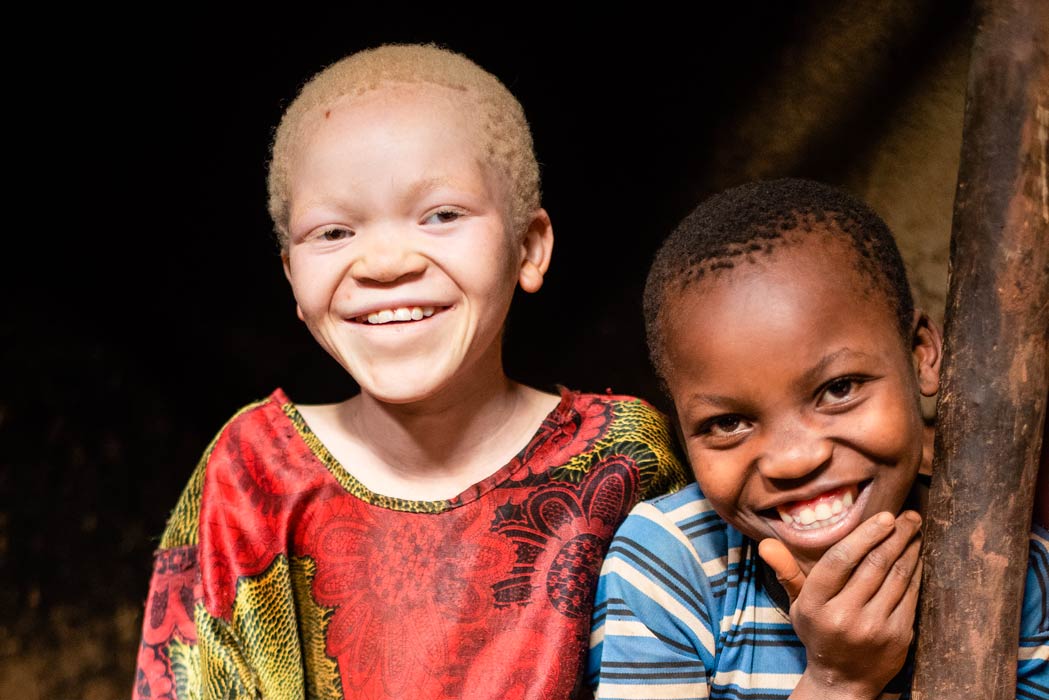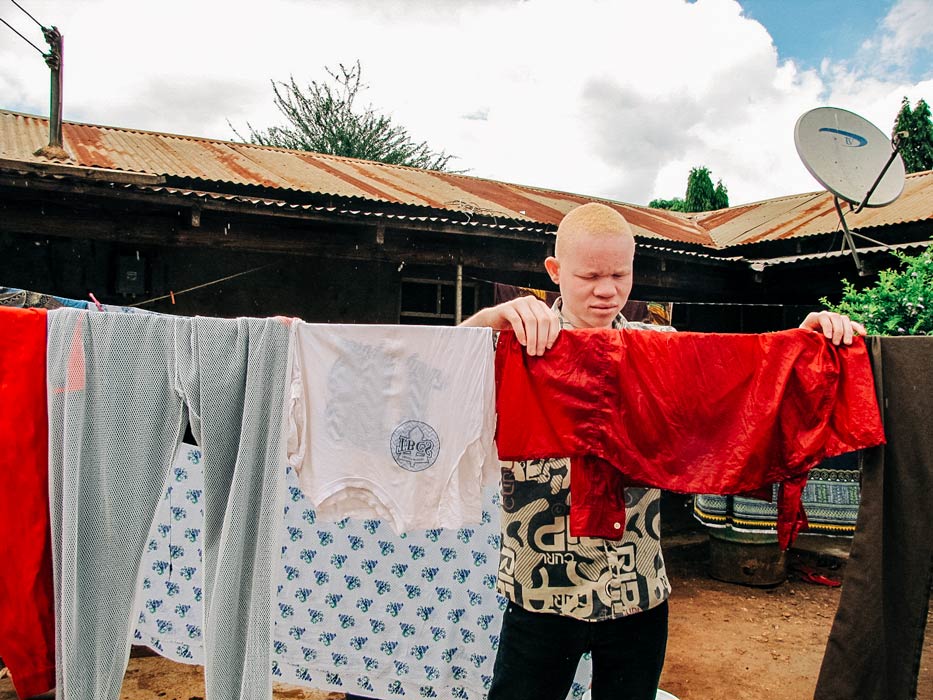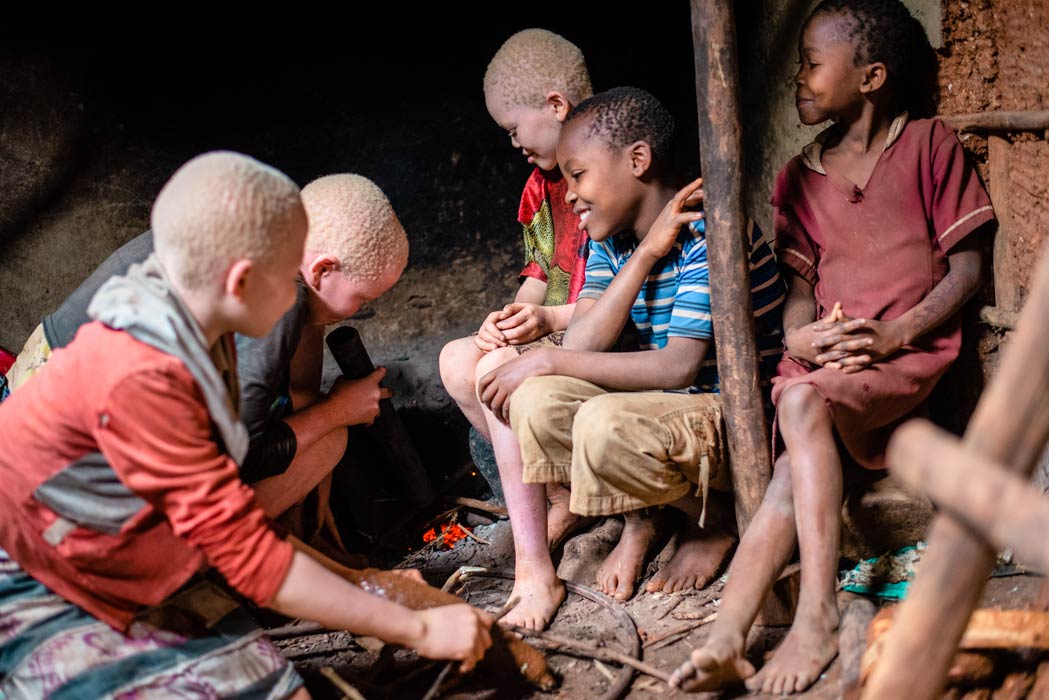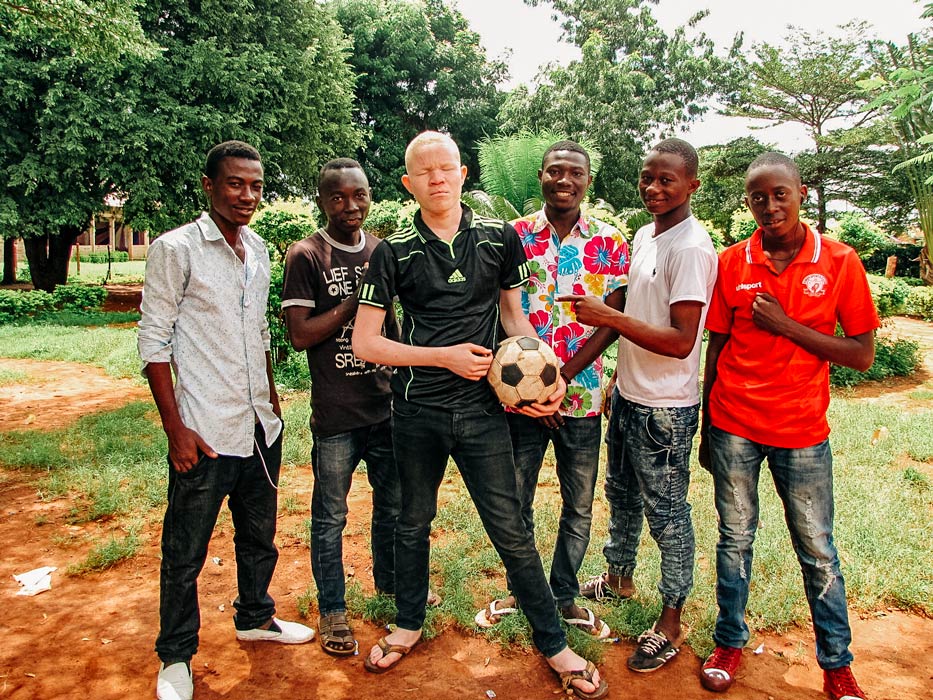Born with albinism, Selinah, Grace, and Yona face real challenges. Here are five things they want you to know.
10 Jun, 2020
Meet playful Selinah, deep thinker Grace, and science whizz Yona—three young people with dreams and determination who happen to have albinism.
The rare genetic condition reduces the amount of melanin formed in the skin, hair, and eyes, and can create serious health and social challenges. Yet the trio hopes you will see how they are so much more than the condition they were born with.
For International Albinism Awareness Day, we're sharing five things Selinah, Grace and Yona want you to know about the condition.
1. We are not defined by our medical condition.

In Uganda, 10-year-old Selinah is like any other child. She loves chasing her younger brother and laughing with her sisters. To her band of six siblings, and at her local church, she's just one of the gang.
Across the border in Tanzania, Yona is a keen science student who dreams of becoming a chemical engineer. His hard work and determination in senior school saw him graduate among the top of his class.
In Tanzania's capital, Grace loves to sing and has a passion for justice. One of the biggest challenges she faced as a teenager was not related to albinism at all, but peer pressure—something confronted by youth all over the world. She tackled it the same way she deals with every challenge: with steadiness and optimism.
2. Stigma hurts, but we are standing strong.

Despite progress, young people with albinism still face discrimination.
Common myths say those with albinism have lower intellect and red eyes. In some cultures, superstitions brand people with albinism as ghosts who possess superpowers or bring bad luck.
"My fellow students and people nicknamed me 'Mzungu', meaning 'white man'," says Yona. "It was a bit hard for me to accept such comments or joke, but now I am used to them and their jokes are slowly diminishing as they see my determination and what I have been able to achieve."
Grace remembers shrugging off cruel comments as a young child but says, for the most part, she felt accepted by her community. Sadly, her father walked out on the family shortly after she was born—he said Grace couldn't be his child because no one in his clan had been born with albinism before.
In Selinah's family, three of the five children have albinism. They too, experienced stigma from extended family members.
"The clan mistreated us because of the children's appearance," says her single father, Peter. "It caused a disagreement between me and clan members and I had to cut them off."
Stigma can hurt, but Selinah, Grace and Yona stand strong in the face of it surrounded by loving family members and caring Compassion staff.
3. Myths and superstition are dangerous.
In some communities around the world, superstition can be life-threatening.
In the early to late 2000s, a wave of ritual killings and amputations of people with albinism—especially children—spread in Tanzania.
'Traditional healers' sold good luck charms made from their bones and blood. The horrific practice was widely condemned and the government took strong action, but the terror—and danger—still linger today.
In Selinah's very own neighbourhood, neighbours played cruel pranks on her family, deliberately offering them food they were allergic to, so their skin would react in painful sores.
In recent years, the Tanzanian government has launched awareness campaigns about albinism, banning witchdoctors to help stop the attacks. On the ground, child advocacy organisations like Compassion continue to work with individual children like Selinah, Grace and Yona to ensure they are known, loved, and protected.
4. We face medical complications.

The impact of albinism goes beyond skin, hair and eye colour. The condition causes vision problems that are not correctable with glasses, and many children with albinism have low vision and are classified as legally blind. Due to a lack of pigment in their eyes, bright light is also incredibly uncomfortable.
The lack of skin pigment also makes people with albinism more susceptible to sunburn and skin cancers. In rural farming communities, their fair skin can put them at a disadvantage, as they may be unable to work outside.
"I faced sunburn because of my skin, especially during hot seasons, and my sight in the sun is much disturbed," says Yona. "But with the support of a cap and sunglasses for these extreme situations, I did not give up."
Poverty can make life difficult for families like Grace's to afford the skincare and sun protection their children require. Compassion's local church partner provided her with extra support through the Highly Vulnerable Children fund so she can receive the lotion and glasses she needs.
5. One person can make all the difference.

Selinah has a loving immediate family, and her father is her champion. He has taught her that each day is an opportunity to embrace life. The family does this wholeheartedly, talking, laughing, and enjoying each other's company.
From the moment baby Grace was placed into her mother's arms, Flora loved her fiercely. She found the same dedication to her daughter's wellbeing in Grace's tutor, Florencia, at her local Compassion centre.
When Grace began attending school, Florencia spoke to the teachers to ensure she received the support she needed, like sitting in the front row so she can follow the lesson with her low vision.
"I would not have been able to reach where I have reached if it had not been for Compassion's support," says Grace "May God richly bless you."
Being registered in Compassion's Child Sponsorship Program when he was five years old introduced Yona to a community of people outside of his family who loved and accepted him just as he is. Since then, Yona has had the support of an encouraging sponsor who spoke words of life over him.
"My sponsor has stood by me from the beginning. He has been sending encouraging words about the future and my dream," says Yona. "He lets me know that he's praying for me. His support is invaluable."
Education and understanding are the first steps towards breaking the stigma facing Selinah, Grace, Yona, and thousands of others with albinism. Let's celebrate the courage and achievements of these brave young people, who stand strong in the face of adversity and pave the way together for empathy and acceptance.
If you would like to bring hope to a vulnerable child living in poverty, consider giving to our Highly Vulnerable Children fund today.
Words by Zoe Noakes
Photos by Caroline A. Mwinemwesigwa and Charles Ngowi

